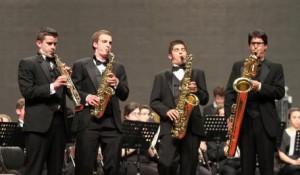Composers!

It is my pleasure to announce the Donald Sinta Saxophone Quartet’s first ever Composition Competition! The Donald Sinta Quartet (Dan Graser, Zach Stern, Joe Girard, Danny Hawthorne-Foss) is based in Ann Arbor and was handpicked from Donald Sinta’s Classical Saxophone studio at the University of Michigan, the same studio that produced the world-famous PRISM Quartet.
This competition coincides with the DSQ’s Paris debut in April, and the winning pieces will be performed at the Paris Conservatory, the Selmer Show Room in Paris and at other domestic performances. The competition’s deadline is February 15th, there is no application fee and more specific details regarding submissions can be found here on the DSQ’s website.
The members of the Donald Sinta Quartet have demonstrated a strong commitment to new music and living composers as long as I’ve been in Ann Arbor. Ron Amchin, a senior composition student whose work, Hot Foot, is part of the DSQ’s Spring tour commented, “They’re awesome! They will play anything you write and love challenges.”
I caught up with the DSQ’a frontman, of sorts, Dan Graser (soprano saxophone) and asked him about the group’s goals for this competition, along with the importance a new works by American composers to the growth and strength of saxophone quartet repertoire. Our conversation presented below.
Enjoy, and don’t forget to submit your best saxophone quartet piece to the Donald Sinta Quartet’s Composition Competition!
S21: What are your goals and parameters of the competition?
DG: The primary purpose of the contest is to generate several great new works for saxophone quartet from young American composers. When we were given the opportunity to perform in Paris for one of the finest saxophone studios in the world, we wanted to showcase everything that both American saxophonists, and American composers are capable of. While there is a great tradition of French saxophone repertoire that all saxophone quartets perform, our purpose with this contest is to begin establishing a greater repertoire from American composers and create a renewed national interest in writing for saxophone quartet.
Two of the works will be given a premiere in Paris and receive a cash prize, however, we will also be premiering many of the works submitted for the contest on several recitals around the US following the Paris concerts. It is our intention not only to showcase the two winners but also to expand our group’s repertoire with new music and champion this music for years to come. It is our hope that after writing for the group, the composers with whom we interact during the course of this competition will be encouraged to continue writing for the saxophone.
S21: In your view, how does contemporary music fit into saxophonists’ and saxophone quartets’ repertory?
DG: As a saxophonist, you are fortunate that much if not most of your artistic life is spent with new music and with commissioning. One of the more rewarding parts of playing the instrument is being an active participant in the creation of new repertoire that stretches the boundaries of what had previously been thought possible. That mission has been a running-theme in the life of saxophonist and UM Professor Donald Sinta. The dozens of works written for and premiered by him for the past 40 years consistently pushed the saxophone to new sonic and technical limits. His pedagogy has always been reflective of our need as saxophonists to expand the repertoire and to expand our own capabilities. It was not only his great mentoring and friendship but also this shared mission for raising the standard for the instrument that inspired our group’s name, the Donald Sinta Quartet.
Our relatively brief existence has been about bringing the latest and best music to an international stage. After premiering William Bolcom’s Concerto Grosso for Sax Quartet and Band in Ann Arbor, Los Angeles, and through several cities in China, we set out to bring several University of Michigan composer pieces to international awareness. Recitals in Scotland for the World Saxophone Congress and in Greece for the International Society for Music Education Conference featured student composer pieces exclusively. This is a tradition we will be continuing on a yearly basis and we are very fortunate that this year we can bring the best new music from the US to Paris!
S21: What are your feelings about working with living composers?
DG: Working with composers on new repertoire is a particularly rewarding experience for both parties concerned. Not only does the composer become intimately familiar with the instrument(s) but also the performers he/she is writing for. The performers are then blessed to receive a piece of music that was written specifically for them.
We want a composer to be inspired by our abilities and we do our very best to accommodate any demand they place on us. A recent request of a student composer was, “Write whatever you want, but make it impossible!” It’s our responsibility as performers to have no technical limitations. There is no such thing as writing “idiomatically,” for the saxophone and we encourage all composers to experiment with what they may think is possible.
Remember, more information about the group and their composition competition can be found at the Donald Sinta Quartet’s website, here.
